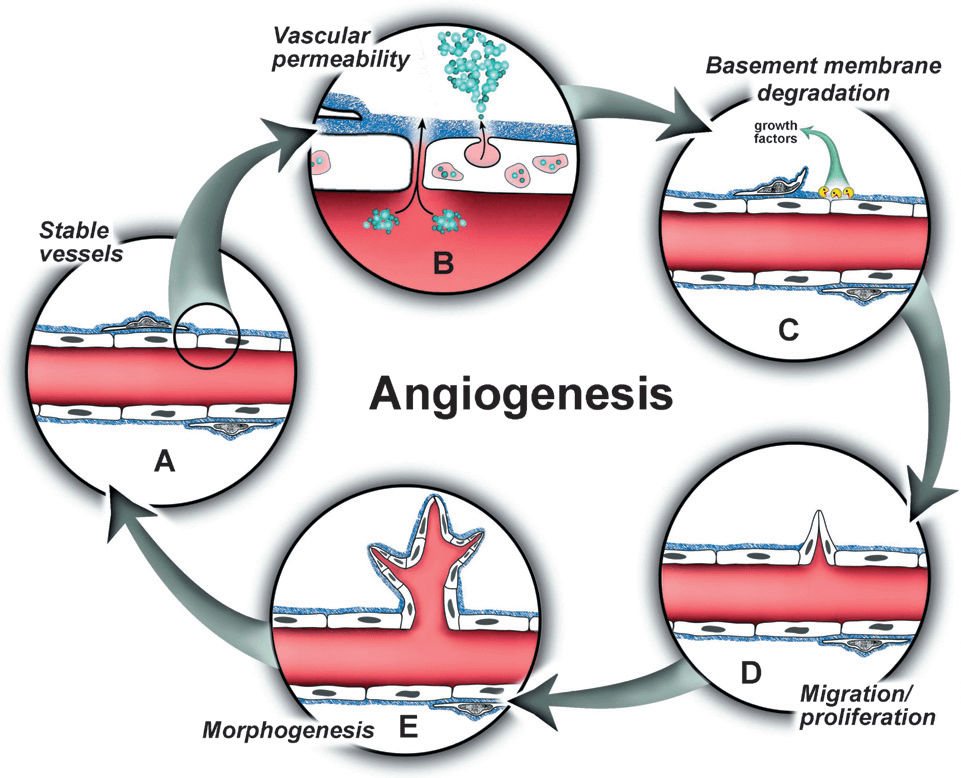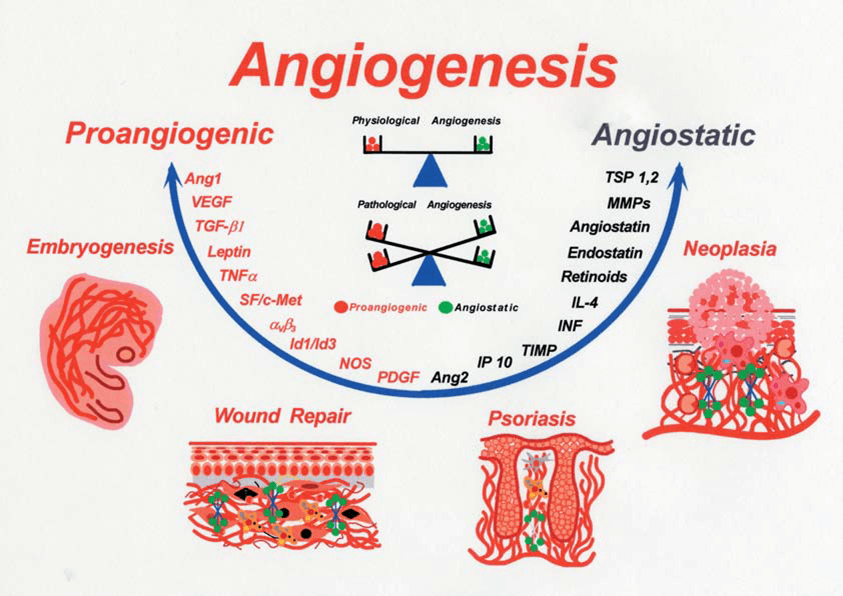Creative Bioarray provides a series of in vitro angiogenesis assays to help reveal the underlying mechanisms, or discover and evaluate the efficacy of pro- or anti-angiogenic agents.
Introduction of Angiogenesis
Angiogenesis, which refers to the germination of new blood vessels from the existing blood vessels, is a tightly regulated and sophisticated multistep physiological process involving many kinds of cells and molecules. Angiogenesis is a normal and vital process occurring naturally during growth, development, reproduction, wound healing, and tissue repair. It is critical to maintain the circulation of blood, deliver gases and nutrients, clear waste products, and form granulation tissue.
 Figure 1. The angiogenic cascade. (Bryan B A, & d’Amore P A., 2007)
Figure 1. The angiogenic cascade. (Bryan B A, & d’Amore P A., 2007)
Angiogenesis, which is responsible for almost all blood vessel growth, is a fundamental component and a common controlling factor of various diseases, such as cancer, cardiovascular diseases, rheumatoid arthritis, stroke, and atherosclerosis. The abnormal structures formed by pathological angiogenesis are the underlying cause of many deadly diseases. Uncontrolled angiogenesis is a necessary component of tumor growth and metastasis, which can lead to the transition from a benign state to a malignant one. In contrast, diseases like stroke and coronary artery disease are related to insufficiency of blood vessel growth.
Angiogenesis assays can help to better monitor the phenomenon and understand the underlying mechanisms that mediate angiogenesis. Subsequent manipulation of angiogenesis by pro- or antiangiogenic agents, such as angiogenesis inducers, angiogenesis inhibitors and proteolytic enzymes, offers potential therapeutic opportunities for cancer and other antigenic diseases. Angiogenesis-based therapy may provide a safe and reasonable novel treatment in the future care of patients.

Figure 2. The balance between pro-angiogenic and anti-angiogenic agents in health and disease. (Polverini P J., 2002)
Angiogenesis Assays Available at Creative Bioarray
To fully determine angiogenesis, we can provide various assays including but not limited to the following:
Tube Formation Assays
Tube formation refers to the ability of endothelial cells to form three-dimensional capillary-like structures under the support of appropriate extracellular matrix. Tube formation assay is one of the most specific and widely used in vitro assays for angiogenesis. The ability of agents to promote or inhibit tube formation can be determined.
Endothelial Adhesion Assays
The cell-cell interactions between endothelial cells and immune cells play an important role in inflammation and immune response. Endothelial adhesion assays can be used to quantify the number of immune cells, such as monocytes, adhering to endothelial cells.
Endothelial Cell Migration and Invasion Assays
The migration and invasion of endothelial cells are essential to angiogenesis. Boyden chamber assay and transwell assay are the two most commonly used methods. These assays are helpful to study the underlying mechanisms of angiogenesis.
Endothelial Cell Proliferation Assays
Endothelial cells proliferation is a basic biological process within the process of angiogenesis. Cell proliferation assays are commonly used to provide highly reproducible and precise quantifiable data for determining cell division and cell cycle kinetics.
Microfluidic Angiogenesis Assays
To study the promoting or inhibiting effects of compounds on angiogenesis is of great significance for the treatment of various diseases, such as cancer, cardiovascular diseases and stroke. With unprecedented optical resolution, microfluidic technique can provide a powerful quantitative platform for angiogenesis monitoring.
Aortic Ring Assays
Aortic ring assay, which is considered to closest simulation to the in vivo situation by organ culture methods, has become one of the most widely used assays to assess the complexities of angiogenesis. Rat aortic ring, mouse aortic ring and chick aortic arch are commonly used models.
Creative Bioarray has the capacity to customize the best solution in a timely and cost-effective manner to meet the requirements of our customers. Our ability of angiogenesis research will accelerate your research and drug development project. If you need more detailed information, please feel free to contact us. We look forward to cooperating with you.
References:
- Bryan B A, & d’Amore P A. What tangled webs they weave: Rho-GTPase control of angiogenesis. Cellular and molecular life sciences, 2007, 64(16), pp: 2053-2065.
- Polverini P J. Angiogenesis in health and disease: insights into basic mechanisms and therapeutic opportunities. Journal of dental education, 2002, 66(8), pp: 962-975.
- Augustine R, et al. Therapeutic angiogenesis: From conventional approaches to recent nanotechnology-based interventions. Materials Science and Engineering: C, 2019.
For research use only. Not for any other purpose.

 Figure 1. The angiogenic cascade. (Bryan B A, & d’Amore P A., 2007)
Figure 1. The angiogenic cascade. (Bryan B A, & d’Amore P A., 2007) 
